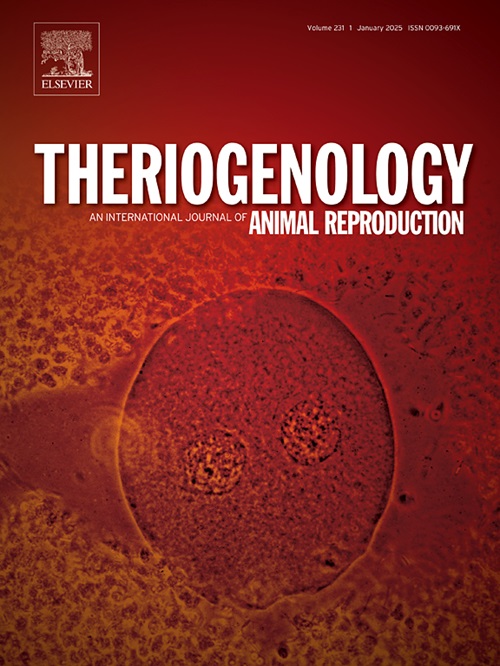抗冻蛋白III对犬精子冷冻保存的影响。
IF 2.4
2区 农林科学
Q3 REPRODUCTIVE BIOLOGY
引用次数: 0
摘要
精子冷冻保存在生殖生物技术中至关重要;然而,冷冻和解冻精液的寿命受到精子细胞完整性恶化的限制。本研究旨在检测在稀释液中添加抗冻蛋白III (AFP III)的效果,使用来自8只健康成年犬的样本。将射精液分成等分,用含有AFP III的标准三果糖蛋黄扩展剂稀释,浓度分别为0、0.75、1.0和2.0 μg/ml。解冻后,分析样品的运动学参数、膜完整性、脂质过氧化、活力、顶体完整性、细胞内过氧化氢、线粒体膜电位和凋亡指标。结果表明,虽然治疗组和对照组之间的运动和速度差异不显著(p < 0.05),但治疗组总体表现较好。其中,与2.0 μg/ml组相比,0.75和1.0 μg/ml组表现出更好的运动。此外,磷脂酰丝氨酸易位、脂质过氧化、线粒体膜电位和过氧化氢水平也有显著差异(p 0.05)。然而,与对照组和2.0 μg/ml组相比,0.75和1.0 μg/ml组表现出更好的效果。这些结果表明,添加抗冻蛋白,特别是AFP III,可以显著提高犬精子在冷冻保存过程中的保护作用。这种增强在各种参数中都很明显,强调了AFP III在维持精子质量方面的有益作用。本文章由计算机程序翻译,如有差异,请以英文原文为准。
Influence of antifreeze protein III on canine sperm cryopreservation
Sperm cryopreservation is crucial in reproductive biotechnology; however, the longevity of frozen and thawed semen is limited by the deterioration of sperm cell integrity. This study aimed to examine the effects of adding antifreeze protein III (AFP III) to the diluent, using samples from eight healthy mature dogs. The ejaculates were divided into aliquots and diluted with a standard Tris-fructose-egg yolk extender containing AFP III at concentrations of 0, 0.75, 1.0, and 2.0 μg/ml. After thawing, the samples were analyzed for kinematic parameters, membrane Integrity, lipid peroxidation, viability, acrosome integrity, intracellular hydrogen peroxide, mitochondrial membrane potential and apoptotic metrics. The results show that while motility and velocity were not significantly different between the treated and control groups (p > 0.05), the treated groups generally performed better. Specifically, the 0.75 and 1.0 μg/ml groups exhibited better movement compared to the 2.0 μg/ml group. Additionally, there was a significant difference (p < 0.05) in membrane integrity between the control and treated groups, though no differences were observed among the treated groups. Significant differences (p < 0.05) were also observed in viability and acrosome integrity, with the 0.75 and 1.0 μg/ml groups outperforming the control and 2.0 μg/ml groups. There were no significant variations (p > 0.05) in phosphatidylserine translocation, lipid peroxidation, mitochondrial membrane potential, or hydrogen peroxide levels. However, the 0.75 and 1.0 μg/ml groups demonstrated superior effects compared to both the control and the 2.0 μg/ml groups. These results suggest that the addition of antifreeze proteins, specifically AFP III, markedly improves the protection of canine sperm during cryopreservation. This enhancement is evident in various parameters, underscoring the beneficial effects of AFP III in maintaining sperm quality.
求助全文
通过发布文献求助,成功后即可免费获取论文全文。
去求助
来源期刊

Theriogenology
农林科学-生殖生物学
CiteScore
5.50
自引率
14.30%
发文量
387
审稿时长
72 days
期刊介绍:
Theriogenology provides an international forum for researchers, clinicians, and industry professionals in animal reproductive biology. This acclaimed journal publishes articles on a wide range of topics in reproductive and developmental biology, of domestic mammal, avian, and aquatic species as well as wild species which are the object of veterinary care in research or conservation programs.
 求助内容:
求助内容: 应助结果提醒方式:
应助结果提醒方式:


